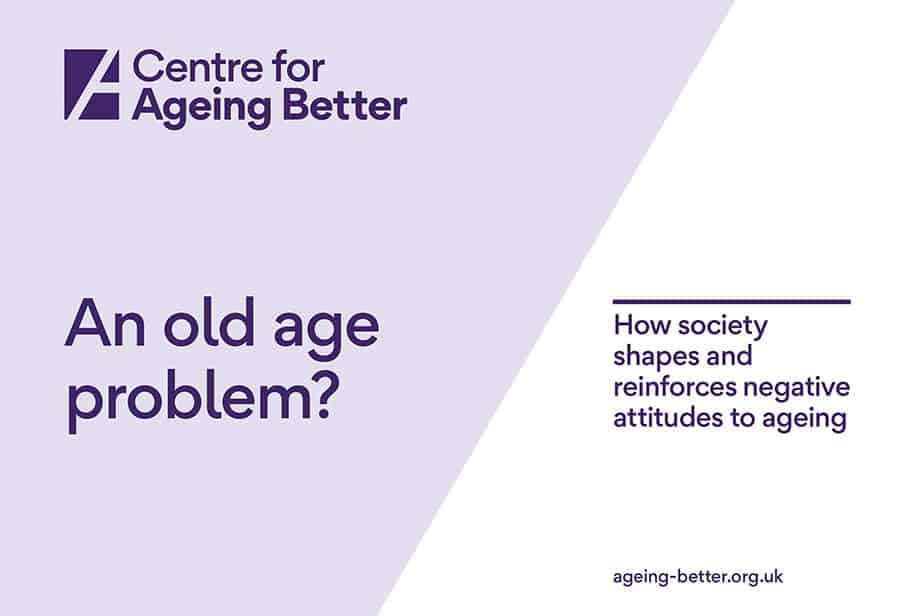Negative attitudes towards older people perpetuate damaging views of later life, report finds

Language used across society to describe ageing and older people, including narratives around elderly people being a ‘burden’ on health and social care, risks ‘damaging UK’s social fabric’, a new report from the Centre for Ageing Better warns.
The charity says the way ageing is discussed across different sectors reinforces concerns raised during the coronavirus crisis that key parts of society perpetuate negative and damaging views of later life.
Ageing Better adds that older people are often unfairly described as being solely responsible for the annual winter ‘crisis’ in political discourse, which disregards the fact that people of all ages use health and social care services.
Now, the Centre for Ageing Better is calling for age to be added to the protected characteristics covered in the Editor’s Code, which sets out expectations with regards to avoiding discrimination in the media.
Anna Dixon, Chief Executive at the Centre for Ageing Better, said: “Open a newspaper on any day of the week and you’re likely to find articles which refer to the ‘crisis’ of an ageing population, ‘selfish’ boomers, or the ‘burden’ of older people on the NHS.
“Our new research highlights how pernicious these negative views of old age can be, with later life talked about most often in terms of decline, dependency and vulnerability across a range of sectors and representations of age in public life that are drawn from outdated assumptions and negative stereotypes.”
Entitled ‘An old age problem? How society shapes and reinforces negative attitudes to ageing’, the report explores the language used across society related to ageing and older people. It reveals negative attitudes that risk damaging the country’s social fabric by stoking intergenerational tension and potentially affecting policy-making.
Analysing the way ageing and later life are spoken about in politics, the media, advertising and the charity sector, the report reinforces concerns raised around the treatment of older people during the COVID-19 pandemic.
Ageing Better analysis shows that ageing is associated with decline and ill-health, and older people are commonly portrayed as frail, vulnerable and dependent, with the top ten most frequently used words across society including ‘help’, ‘care’, ‘challenges’, ‘support’, ‘dementia’ and the ‘NHS’.
The report further uncovers that political discourse mainly frames the ageing population as a costly ‘crisis’, emphasising the dependence of older people on state support, which overlooks the vital contribution of people at older ages to society including caring for loved ones and providing support in communities.
In politics and the media, Ageing Better found that older people are often pitted against younger people in ‘boomer vs millennial’ narratives around competition for resources, with older age often being used as a proxy for wealth. Ageing Better’s report warns that this hides the inequalities that exist within generations.
The charity says that these negative ways of talking about elderly people underpin the issues seen during the COVID-19 pandemic, with older people treated as a homogenous group who are vulnerable, frail and a problem to be managed, rather than citizens of equal value.
Negative attitudes to older people have serious consequences, the charity warns, sowing distrust between generations and potentially affecting policy-making decisions.
Drawing on the findings from its report, the Centre for Ageing Better is calling for age to be added to the protected characteristics covered in the Editor’s Code.
“The serious concerns raised about the treatment of older people during the pandemic have highlighted the real-world consequences of this kind of language,” Anna continued. “The call for a ‘cull’ of the elderly was one particularly extreme response to the crisis, but it’s clear that negative attitudes to later life could have an impact on policy-making.
“We’re all living many years longer than our parents or grandparents, so it’s vital that we find new ways of talking about ageing. Politicians and those working in the media have a huge amount of power to shape the way we discuss these issues, and a responsibility to represent the reality and diversity of later life.”
In addition, the Centre for Ageing Better report underlines that political discourse relating to ageing often revolves around pressures on the health and social care system. The charity says that the focus is often on specific issues or services including things like bed capacity, care quality and the annual winter ‘crisis’.
Ageing Better says that whilst the winter can be a difficult time for older people, commonly framing this as a ‘crisis’ implicitly associates ageing and demographic change with catastrophic consequences.
“In turn, this feeds the wider perception that ageing is a problem and older people as dependent on and a burden to the state,” the report says.
The charity quickly points out that people of all ages use social care services and that political discourse that suggests social care is solely for older people – and that the funding ‘crisis’ is ultimately driven by them – is “hugely damaging”. Rather, Ageing Better says that without adequate funding for social care services, large parts of the population’s needs will not be met.

